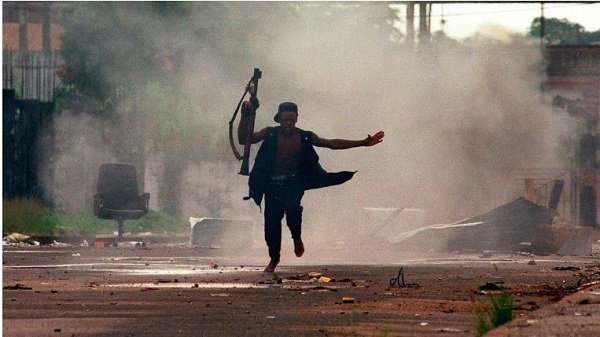
A fighter runs from an explosion in Monrovia in 1996 during the Liberian civil war
PARIS, Nov 6 (NNN-GNA) — Human rights groups have hailed the conviction of a notorious former Liberian rebel commander Kunti Kamara as a milestone, noting that it raises hope for justice for victims of the West African country’s brutal 12-year civil war.
Kamara, also known as Kunti K. or CO Kunti, was convicted of war crimes and sentenced to life imprisonment by a French court.
The verdict announced on Nov 2, brought to an end about four weeks of trial that was preceded by a two-year investigation.
Amnesty International France, the International Federation for Human Rights (FIDH), and Human Rights Watch, in a joint statement issued on the same day, said the verdict represented hope for justice for victims of the Liberian war, urging the authorities to reconsider their position on calls for a court to try suspected perpetrators.
Kamara was a member of the United Liberation Movement of Liberia for Democracy (ULIMO), one of the five main warring sides that participated in the country’s two wars, 1989 to 1997 and 1999 to 2003. ULIMO, which later disintegrated into two factions, was most active during the first war.
He was found guilty of complicity in crimes against humanity and responsibility as a direct perpetrator of torture and “barbaric acts”, according to the Paris Criminal Court which heard the case.
ULIMO is accused of perpetrating killings, rape, beatings, forced labor and torture of its victims. Witnesses and some victims reportedly identified Kamara as one of those who were physically involved in committing those crimes. The 47-year-old reportedly committed the crimes between 1993 and 1994.
Witnesses narrated graphic details of his crimes, including the killing of a whistle-blower with an axe and then eating his heart. His group also kept young women as sex slaves, the court heard.
Since the end of the Liberian civil war, rights groups have been trying to bring to justice people considered as having committed the greatest crimes, amid reluctance by successive governments to do so.
More than 250,000 people were killed and nearly a million displaced by the end of the war, according to reports.
A truth and reconciliation commission set up in 2006 to probe crimes committed during the war published its reports in 2009 but its recommendations remained largely unimplemented. Both former President Ellen Johnson Sirleaf and current President George Weah chose peace over justice.
“More than 25 years later, the French court’s verdict is a ray of hope that justice is possible for the victims in Liberia,” said Elise Keppler, associate international justice director at Human Rights Watch.
“The Liberian government should stop dragging its feet and request the UN, US, African Union, and other international partners to assist in setting up a war crimes court so more people implicated in crimes during the civil war can be held to account.”
Kamara was first detained in 2018 after the rights campaign group Civitas Maxima took up his case with French authorities. The subsequent investigations included a two-week fact-finding mission in the northwestern Lofa County of Liberia where his faction was reportedly based.
The trial by France was possible because of a 2012 law that recognizes certain serious crimes under international law.
The universal jurisdiction law allows for the prosecution of such crimes regardless of where they are committed or the nationality of the suspects or victims.
The Kamara trial is also said to be the first under the law after cases related to the Rwandan genocide.
Kamara is also one of the few persons who have been tried for war crimes in connection to the Liberian civil wars. — NNN-GNA






